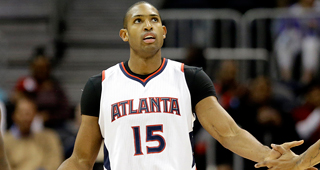The NBA has its Final Four with the Houston Rockets joining the Golden State Warriors, Atlanta Hawks and Cleveland Cavaliers.
While both conferences were expected to be fairly wide open, particularly the Western Conference, we instead have the No. 1 and No. 2 seed in each advancing.
These teams were unsurprisingly amongst the highest ranked in efficiency differential, offense and defense.
Warriors (1st, 2nd, 1st)
Hawks (4th, 6th, 6th)
Cavs (5th, 3rd, 18th)
Rockets (7th, 12th, 8th)
The following infographics show the percentile rankings for each team in the critical categories of offensive efficiency, defensive efficiency, rebound percentage, assist percentage, three-point percentage and foul rate during the regular season.
The Cavaliers are without Kevin Love and Kyrie Irving has been severely limited, which makes the team we're seeing now considerably different than the one that was an offensive juggernaut from January onward. But they still rank first in the playoffs in offensive efficiency at 110.9 points per 100 possessions. The extra possessions generated by Tristan Thompson and company have turned the stretch-4 advantage of Kevin Love into an extra possession-4 to help maintain their offensive efficiency despite a poor jump shooting turn in the playoffs by LeBron James.
For Cleveland, the question will continue to be whether they fall in love with isolation basketball late in close games and if they will be good enough on defense
The Hawks have shown glimpses of that shared Conference Player of the Month honors in January with Al Horford in particular playing well, but they've also strangely had Dennis Schroder playing some key minutes down the stretch with their season on the line instead of Jeff Teague. The shooting of Kyle Korver has been spotty and not having Thabo Sefolosha has been a real loss. Mike Budenholzer has his team in the Conference Finals despite their imperfections and the Cavaliers still look like a favorable matchup.
For the Warriors, they faced considerably more of a challenge in the first round than that sweep over the New Orleans Pelicans looks in hindsight. The Game 3 comeback was improbable and legendary, while they were legitimately tested in Games 2 and 4. The Grizzlies also hit them in the mouth in Games 2 and 3, and the Andrew Bogut on Tony Allen defense in Game 4 was the type of brilliant in-series adjustment that saves seasons. There is always a concern with newer teams lacking the playoff mettle, but they have enough of it now where they should feel confident knowing it will come down to "my best against your best."
Golden State has a +8.6 efficiency differential in their 10 playoff games.
The obituaries for the Rockets were outlined after Game 5 and written during the third quarter of Game 6, but here they are on the backs of Josh Smith, Corey Brewer, Jason Terry, the continued MVP-caliber season of James Harden and a rejuvenated Dwight Howard. Houston may be a Patrick Beverley and Donatas Motiejunas short against the pace of the Warriors, but the Rockets have the double-superstar formula that can grind out wins if a third scoring option can show up.




In terms of



